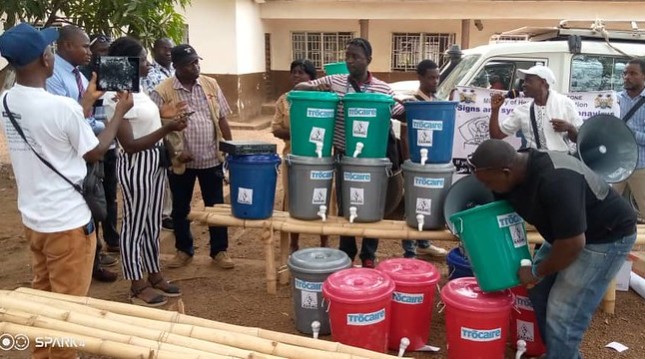-
Water for the Most Vulnerable Could Help Stop Spread of Covid-19

Development specialists are sounding the alarm. The pandemic will not be stopped unless we provide safe water to the world’s most vulnerable people, according to UN experts. Soap and clean water are part of the arsenal of weapons we can deploy on the frontlines of the battle to halt the virus’ spread. Yet Covid-19 continues to pose an unprecedented threat to more than 2 billion of the world’s poorest people who lack the access to safe water, sanitation, and health services (WASH) needed to protect them during infectious disease outbreaks, according to the World Health Organization.
Vulnerable people become even more defenseless when armed conflict displaces them, blocking access to health care and humanitarian aid. And the destruction of water infrastructure and health facilities means civilians in armed conflict areas may not be able to practice the most basic infection prevention measures, such as frequent handwashing to slow the spread of the virus.
Water Matters
Water must be protected from armed attacks and must not be used as a weapon of war, according to the Global High-Level Panel on Water and Peace, which noticed the adverse consequences of armed conflicts on water resources and infrastructures. Protecting water resources and installations protects civilians in armed conflicts. In places where health systems have been ravaged by war, where people uprooted by conflict live in close proximity, and where life-saving resources like clean water, soap, and medicine are in short supply, Covid-19 poses a particular threat, according to the International Committee of the Red Cross (ICRC). Conflict-affected or post-conflict societies lack access to basic infrastructure or social and sanitary safety nets, disproportionately exposing them to the pandemic, said Jean-Pierre Lacroix, the head of United Nations Peacekeeping.
Given conflict zones’ exposure to the pandemic, the United Nations Secretary-General has appealed to all warring parties around the world to commit to a global ceasefire to focus on “the true fight of our lives,” (i.e., Covid-19), a call that even armed groups have heeded. Some state and non-state actors have been willing to temporarily cease fighting to facilitate humanitarian assistance, in some cases ensuring the passage of medical supplies and humanitarian relief personnel, to contain the spread of the virus, according to the UAB Escola de Cultura de Pau (ECP). Moreover, the UN Secretary-General called for states to designate humanitarian workers as “critical personnel” in the fight against Covid-19. As health workers, humanitarian personnel are needed to deliver life-saving assistance.
Meanwhile, the United Nations General Assembly adopted a resolution on April 2, 2020 calling for more international cooperation to contain, mitigate, and defeat the pandemic, and it reaffirmed its full commitment to improving access to clean water and sanitation (SDG 6). Similarly, many international humanitarian organizations, such as ICRC, UNICEF, UNHCR and the International Organization for Migration, are ramping up assistance to prevent and contain the spread of the virus by setting up and enhancing water and sanitation services for vulnerable communities, mostly those displaced by armed conflicts.
Water for War or Peace
While water can be a powerful tool for cooperation between states, it has often been used as a weapon of war. During the now 10-year war in Syria, both armed opposition groups and the government of Syria were responsible at different times and degrees of cutting water supplies in several cities including Aleppo, Damascus and Raqqa. Deliberately targeting drinking water facilities is a clear violation of both international humanitarian law and human rights law that bind all parties to a conflict, including both state and non-state actors.
The Geneva List of Principles on the Protection of Water Infrastructure (GLP) was developed by the Geneva Water Hub’s Platform for International Water Law, and partners from academia, international and non-governmental organizations in 2019. The first rules on the protection of water infrastructure emerged in 1977 and were codified in the Additional Protocols to the 1949 Geneva Conventions in response to the wars in Southeast Asia. The GLP aims to systematize the law that protects water infrastructure before, during, and after armed conflicts. By taking into account developments in international law since 1970, in particular in the areas of human rights law and international environmental law, this systematization clarifies rules.
The current pandemic highlights the importance of protecting water services as well as other essential services such as energy and sanitation installations for the most vulnerable people in the world. If we are to stop the spread of the Covid-19 pandemic, we must be willing to look beyond our own borders to strengthening cooperation between states and other relevant stakeholders, to use water diplomacy as a mechanism for building trust, peace, and health in the long term.
Mara Tignino is a Reader in the Faculty of Law and Institute for Environmental Sciences at University of Geneva and Lead Legal Specialist for the Platform for International Water Law, Geneva Water Hub
Tadesse Kebebew is a Teaching Assistant at Geneva Academy of International Humanitarian Law and Human Rights and Researcher for the Platform for International Water Law, Geneva Water Hub.
Sources: Africa Renewal, Escola de Cultura de Pau, Geneva Water Hub, International Committee of the Red Cross, UN General Assembly, UN Human Rights Council, UN Secretary-General, UNICEF, World Health Organization.
Photo Credit: Hand-washing station for Covid-19 prevention in Sierra Leone, April 2020. Photo courtesy of Trocaire.
 A Publication of the Stimson Center.
A Publication of the Stimson Center.



